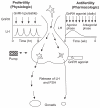Efficacy and safety of gonadotropin-releasing hormone agonists used in the treatment of prostate cancer
- PMID: 22279415
- PMCID: PMC3264425
- DOI: 10.2147/DHPS.S24106
Efficacy and safety of gonadotropin-releasing hormone agonists used in the treatment of prostate cancer
Abstract
Androgen deprivation therapy (ADT) is the most effective systemic treatment for prostate cancer. ADT has been shown to have a high rate of response and to improve overall survival in patients with metastatic prostate cancer. In addition, multiple studies have shown that adding ADT to external beam radiation therapy leads to improvement in cure rates and overall survival in prostate cancer patients. The most commonly used ADT is gonadotropin-releasing hormone (GnRH) agonist therapy. Although GnRH agonist therapy has significant benefits for patients with prostate cancer, it has also been shown to have significant side effects, including fatigue, hot flashes, decreased libido, decreased quality of life, obesity, diabetes mellitus, coronary artery disease, decreased bone mineral density, and increased risk of fractures. Therefore, it is crucial that the benefits of ADT be weighed against its potential adverse effects before its use.
Keywords: androgen deprivation therapy; gonadotropin-releasing hormone agonists; prostate cancer.
Figures
References
-
- American Cancer Society. Facts and Figures 2010. [Accessed October 28, 2011]. Available from: http://www.cancer.org/Research/CancerFactsFigures/CancerFactsFigures/can....
-
- The Leuprolide Study Group. Leuprolide versus diethylstilbestrol for metastatic prostate cancer. N Engl J Med. 1984;311:1281–1286. - PubMed
-
- Vogelzang NJ, Chodak GW, Soloway MS, et al. Goserelin versus orchiectomy in the treatment of advanced prostate cancer: final results of a randomized trial. Urology. 1995;46:220–226. - PubMed
-
- The Medical Research Council Prostate Cancer Working Party Investigators Group. Immediate versus deferred treatment for advanced prostatic cancer: initial results of the Medical Research Council trial. Br J Urol. 1997;79:235–246. - PubMed
-
- Messing EM, Manola J, Yao J, et al. Immediate versus deferred androgen deprivation treatment in patients with node-positive prostate cancer after radical prostatectomy and pelvic lymphadenectomy. Lancet Oncol. 2006;7:472–479. - PubMed
LinkOut - more resources
Full Text Sources


